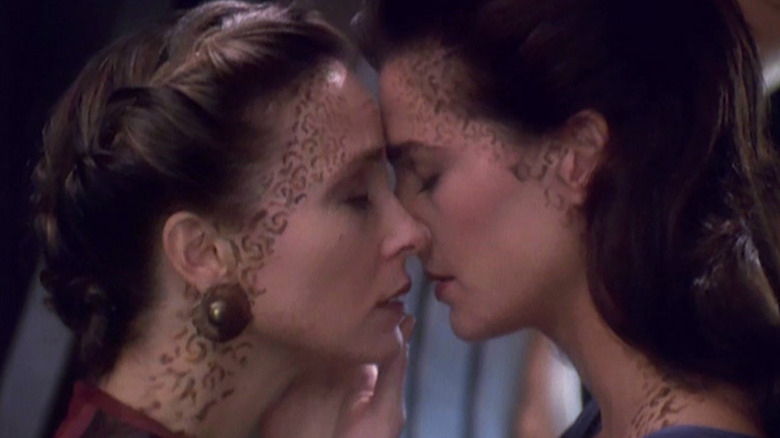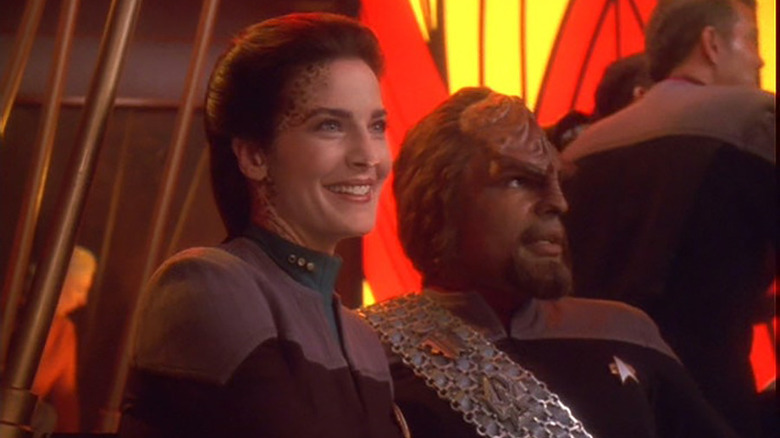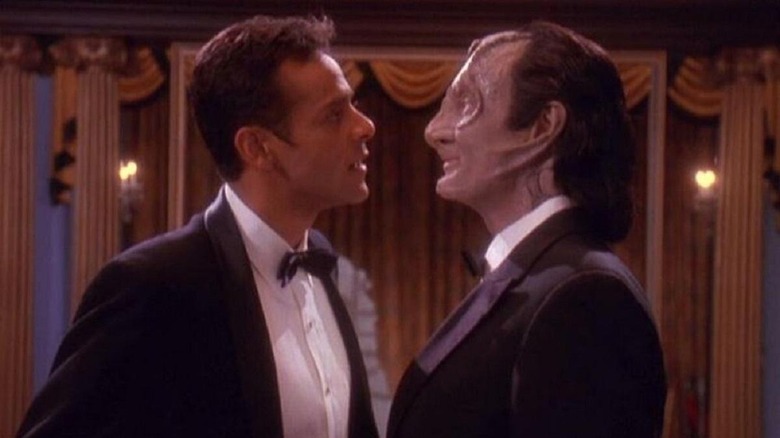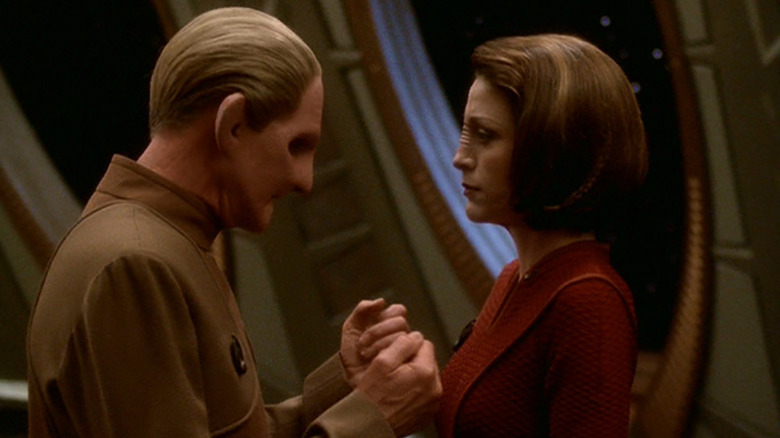Star Trek: Deep Space Nine Taught Me How To Love Myself As A Young Queer Person
The world is looking increasingly hostile to young queer people, as backwards senators push for draconian laws in states like Florida and Texas that will force them to stay in the closet, essentially, until they turn 18. Parents who provide their children with life-saving healthcare in the state of Texas can be charged with child abuse, making it nearly impossible for families to give their kids access to care they need and deserve. Bills introduced in Florida, Georgia, and several other states are pushing to prevent discussions about sexuality and gender in classrooms, under the absolutely ludicrous guise of protecting kids from grooming and pedophilia. LGBTQ teachers and school staff will have to be completely quiet about their personal lives, and students who come to them with questions about their own identities will have to be turned away. If "Don't Ask, Don't Tell" was incredibly harmful to adults in the military who were forced to conceal their identities, one can only imagine how it will impact kids who are forced to comply with these heinous new laws.
Worrying about the present made me take a look at my own past, tracing the steps that led me to live comfortably as an openly pansexual, non-binary person. I spent much of my life without the language to describe myself, only finally coming out as someone attracted to people regardless of gender in my late twenties. Coming out of the gender closet happened only recently, as I finally gained the courage and capacity to tell the world what I've always known about myself.
Though I was a little too young to catch the first few seasons, I started watching "Star Trek: Deep Space Nine" with my parents as it aired in the mid-1990s, and that series gave me my understanding of who I was and what I would one day become, even if I thought at the time it was only in the realm of science fiction. I would have eventually determined my queerness one way or another, though the road might have been significantly more painful if I hadn't been given so many wonderful, complex role models to look up to and learn from, all on a little space station next to an intergalactic wormhole. "Deep Space Nine" didn't make me queer, but it did give me the tools to love myself not in spite of all of the things that made me "different," but because of them.
Jadzia Dax made me feel seen
I didn't realize how much "Deep Space Nine" had impacted me until I re-watched the series as an adult. My first and only run-through had been during my formative years, and it's hard to remember details from something you watched in elementary and middle school, then never really watched again. During the early days of the pandemic, my husband and I watched the series from the beginning. It was a first-time watch for him, and he picked up on aspects of characters that had inspired me without my ever telling him. Some I had never even thought about or realized, and it became clear that this show, and especially the character of Jadzia Dax (Terry Farrell), had left a major imprint on my psyche.
Jadzia Dax is a Trill woman who hosts a symbiont, another alien life form that bonds with its host. The symbiont, Dax, is long-lived, and Jadzia is only the latest in a long line of hosts for the respected Dax. Some have been men, some women, but she still has all of their memories. Bonding with Dax makes Jadzia beyond gender: she's neither male nor female, as her memories of her masculine lives are as real to her as the memories she lived in her own body. Throughout her six seasons on the show, she has romances with both men and women, and Farrell has confirmed that Jadzia was pansexual. Her character was regularly used to create allegories for transgender and non-binary people, as well as for queer relationships. One episode shows Jadzia trying to reignite a relationship from one of Dax's former lives, a serious taboo in Trill society. That taboo is used in lieu of homophobia, and it makes "Rejoined" a powerful episode about love in the face of cultural stigmas.
When Jadzia finally settles down, her marriage partner is still extremely unconventional: she falls in love with Worf (Michael Dorn), a Klingon raised by humans who can understand what it's like to live with your feet planted in two totally different worlds. The pair gave me an ideal of what love could look like, where each partner strives to make the other a better, more complete person. Worf needed someone to help him shake loose from his stoicism and obsession with ritual, and Jadzia needed someone to help her believe in her own inner strength. Even some of the "straight" relationships on "Deep Space Nine" have an element of queerness to them because at least one partner is themselves LGBTQ in some way. Jadzia and Worf's marriage was my blueprint for happiness, though my husband doesn't have any of those hot forehead ridges.
Closeted and confused
Another character that I have always loved and identified with is Dr. Julian Bashir (Alexander Siddig), the space station's playboy chief medical officer. He's hopelessly in unrequited love with Jadzia (and who could blame him), but he also has an ongoing flirtation with one of the ship's most unusual characters. Throughout "Deep Space Nine," Dr. Bashir and the station's Cardassian tailor-slash-"former"-spy, Garak (Andrew Robinson) go from being shipmates who intrigue and annoy one another to close friends to almost having an actual romantic relationship. Unfortunately, "Star Trek" franchise executive producer Rick Berman nixed any chance of the two characters having any sexual or romantic scenes. Berman was fine with the numerous same-sex kisses between women, but drew the line at anything that didn't titillate him, specifically, it seems. (An entire essay could be written about the harm Berman did to the franchise, honestly, but any curious parties should just check out the "Deep Space Nine" documentary, "What We Left Behind" and draw their own conclusions.)
As it stands, Bashir and Garak's romance is only ever hinted at, though "What We Left Behind" confirms that, at the very least, Garak wanted to get a taste of the good doctor. (Again, who could blame him? Is everyone on this station just insanely attractive?) Bashir spends most of the series trying to figure out his own identity. He's brilliant, genetically engineered (a fascinating allegory for neurodivergence), can get almost any woman he wants, and yet he's so lost that he ends up routinely looking to a computer program on the holodeck for advice. Unlike Dax, who confidently comes into her own as the seasons progress, Bashir remains uncertain of himself until the very end. He could have been a two-dimensional stereotype of the hot doctor who gets the ladies, but Siddig's performance and his character's conflicted relationship with Garak made him so much more.
Conventions be damned
"Star Trek: Deep Space Nine" is a series about breaking conventions. The series was derided early on because it was a "Star Trek" where no one was "boldly going" much of anywhere, and the character's interpersonal conflicts were just as important as the intergalactic ones. The characters are all unconventional in one way or another, defying conventions or stereotypes that might easily befall them on a lesser series. Captain Ben Sisko (Avery Brooks) is a single father and the franchise's first Black captain. His number one is Kira Nerys (Nana Visitor), a former Bajoran freedom fighter/terrorist whose devout faith and hard-earned morals are almost constantly at odds. Even the ship's security officer, Odo (Rene Auberjonois) is a challenge to the status quo: he is a shapeshifter, believed to be the only one of his kind. After Odo finds his people and they start a war against all that he holds dear, Odo becomes the only shapeshifter trusted by the Federation. He's constantly challenged by others aboard the space station, who treat him as the enemy simply because of his species. Odo is a true outsider in every way, and his story speaks volumes to how any marginalized person can feel when the world is unnecessarily cruel.
"Star Trek: Deep Space Nine" is by no means a perfect example of LGBTQ representation and there are some mind-bogglingly bad moments (looking at you, Quark gender-swap episode), but it helped me feel less alone as a young queer person who still hadn't found their voice. I didn't know whether I wanted to marry the characters I adored or if I wanted to be them, and by allowing myself to explore these ideas so much at a young age, I was able to not only identify myself, but love myself. After all, if I loved Kira, Dax, Odo, Worf, Bashir, Garak, and the rest of the crew, then why couldn't I love the parts of myself that I saw reflected in them?
Seeing yourself represented can make a huge impact on a person's life. Cinema and television are gateways to understanding; not only one another, but also ourselves. By watching "Deep Space Nine" as a child and an adult I came full circle, seeing myself at different parts of my life reflected in the many complex and colorful characters. After more than three decades of trying to figure myself out, knowing that they are a part of me made me finally feel whole.



